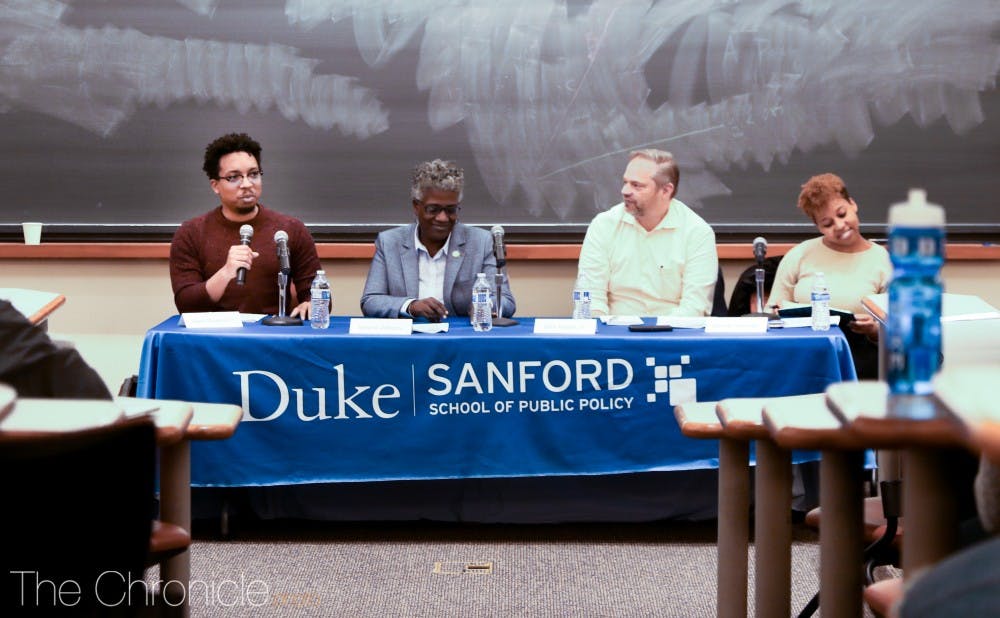In order to cement lasting change, individuals need to put the community’s needs first, three panelists agreed at a Monday talk on activism and organizing hosted by the Hart Leadership Program.
Vann Newkirk II, a journalist for The Atlantic, moderated the panel discussion alongside the three activists. The panel included senior Mumbi Kanyogo, Satana Deberry, Durham County District Attorney, and Don Taylor, professor of public policy and Academic Council chair.
“People always want the issues to be relevant to them, but community organizing must go beyond you as an individual. The community’s goals matter,” said Kanyogo, who is also a member of The Chronicle's independent editorial board. "Also, don’t be disappointed if results don’t appear immediately. We like to imagine that organizing yields results straight away, but most activism involves discussion behind closed doors.”
Taylor, who has studied health care policy extensively—particularly in regard to end-of-life scenarios—lamented how much damage he feels his generation has caused by its lax attitude toward oppression. He was eager to enable young people to take hold of the reins. Taylor also questioned the role of older people in modern politics, especially those who intend to curb the flow of progress.
“It’s felt like there are older people always telling younger people not to push too far," Taylor said. "It’s the whole debate for Democrats: how progressive should the policies be? Should you reach out to the white Rust Belt?"
Taylor later argued that, thanks to Duke’s unique position as one of the most prestigious institutions in the area that once made up the Confederacy, Duke students now have an obligation to remediate past transgressions.
More broadly, Taylor insisted that white North Carolinians should take up the mantle of equity and urge politicians to pass sweeping reforms.
Even as a North Carolina native himself, Taylor recalled not having heard of the Wilmington Massacre of 1898—in which a mob of white conservatives overthrew the elected, black-majority Fusionist officials in the coastal city as the officials were beginning to triumph in their effort to dismantle the Democratic grip on the region.
Taylor exhorted listeners to initiate these conversations sooner rather than later, especially as he said Duke and the United States continue to experience racial maladies.
“As white folks, we have a tendency to write off these incidents as one-offs," Taylor said. "Either we will learn to reckon with our history, or this country will explode. Reckoning means we have to learn how to talk about it.”
Kanyogo then offered her own unique perspective as a current student privy to what she deems the “undergraduate bubble, where we don’t talk about how our actions affect others on campus.”
Kayongo—who in her home city of Nairobi, Kenya, has also volunteered with a movement to effect gender equity in Kenya and more broadly in East Africa—encouraged students to explore the school’s history in order to appreciate the legacy of black staff members.
“There are resources for us to continue that legacy. Duke has great archives," Kanyogo said. "At the same time, there are staffers whose families have worked at Duke for generations, so we should seek to hear their stories and perspectives on the University."
With regard to a question about the current political climate, Kanyogo said that that President Donald Trump’s policies, whether on transgender individuals' place in the military or on immigration, have galvanized young people like never before. She said it was necessary to recognize historical patterns of injustice and warned her fellow activists to not be consumed by the latest outrage.
Deberry, as the only elected official on stage, spoke of the differences between struggling against the status quo and becoming part of it, and she commented on the importance of recognizing both communal issues and intersectionality.
“We have eighty years of black political power in this community," Deberry said. "I think the folks agreed that it’s not enough to be one thing."
Deberry, J.D. '94 and MBA '06, captured the District Attorney position on the campaign promise to push the legal process toward equitable outcomes via criminal justice reform.
“When you’re a system actor and allow the system to continue, it is time for a change,” she said.
Get The Chronicle straight to your inbox
Signup for our weekly newsletter. Cancel at any time.

